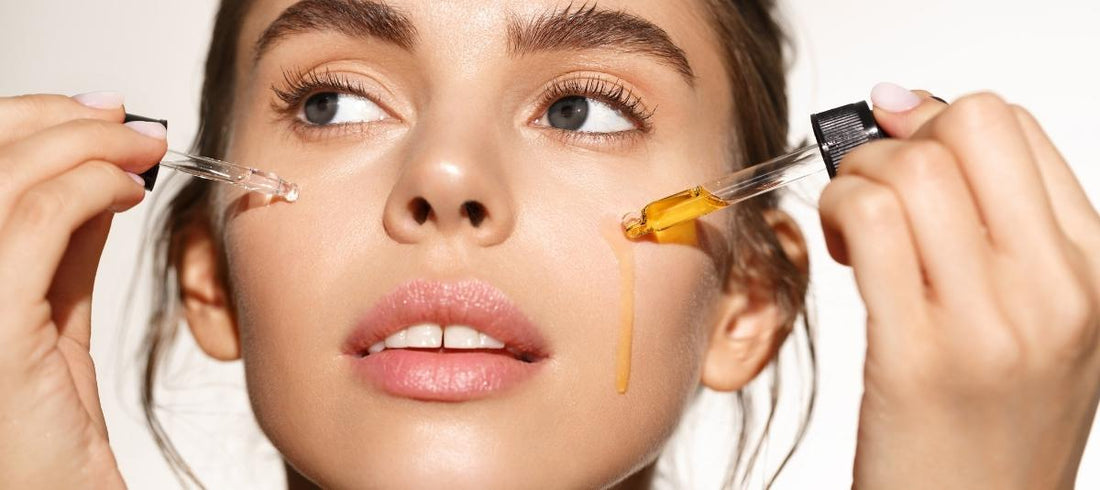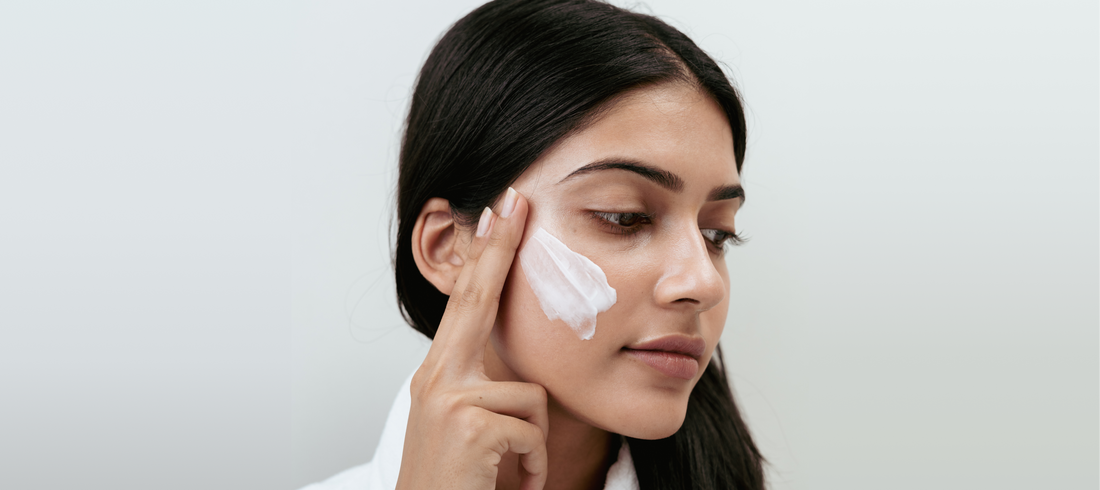There are good skincare combinations—like retinol with niacinamide and glycolic acid with salicylic acid.
But then there are skincare combos that pair so well—you will find them formulated together in one skincare product.
One such combo is vitamin C and hyaluronic acid. Let’s learn more about them—and how they can benefit your skin if used together.
Vitamin C: an introduction and how does it work on your skin
In human skin, among all the antioxidants, Vitamin C is the most abundant.
If we already have it, then why do we need to apply topical vitamin C?
According to a study, humans cannot synthesise vitamin C due to the absence of the enzyme L-glucose-gamma lactone oxidase.
So, even with high doses of vitamin C oral supplements, only a small part of the dosage will be active in the skin.
Thus, we rely on the topical application of vitamin C.
In topical applications of vitamin C, there are generally four derivatives.
Ascorbyl-6-palmitate and Magnesium Ascorbyl Phosphate (MAP) are stable forms of vitamin C, however, they may not effectively absorb within the skin.
L-ascorbic acid, which is considered to be the most biologically active form and is also the most researched—is an unstable molecule and does not penetrate the human skin as effectively as an active ingredient should.
Ethyl-l-ascorbic acid, a form of l-ascorbic acid, is the most stable, and effective, and is the most used vitamin C derivative in topical products.
It works as a potent antioxidant that protects skin from damage caused by sun exposure and other pollutants.
Moreover, vitamin C boosts collagen production, which helps in reducing the appearance of wrinkles and fine lines.
A study also found that vitamin C reduces melanin production, preventing hyperpigmentation and the dark spots caused by sun damage.
“Vitamin C increases the effectiveness of sunscreen, boosting your SPF.”
says Dr. Aseem, MD & DNB.
“It can help with pigmentation and acne-related skin problems,” he adds.
What is Hyaluronic Acid and how does it work?
Hyaluronic acid, also referred to as hyaluronan or hyaluronate, is a glycosaminoglycan that is found naturally in our body.
HA is a primary element that provides our skin structure and gives it a plump.
However, due to environmental damage, HA in our skin declines.That’s why HA is used in topical skincare products to further enhance the skin’s ability to produce more collagen and elastin and prevent any roughness or tightness—common skin concerns for individuals with dry or dehydrated skin.
According to a 2012 study, HA plays a key role in reducing the early signs of ageing such as fine lines and wrinkles.The study concluded that HA may slow down the intrinsic ageing process (ageing that occurs naturally) and provide hydration to the skin.
Can you use Hyaluronic Acid and Vitamin C together?
Yes, you can use vitamin C and hyaluronic acid together. They both complement each other—and do not cause any adverse effects.
In fact, the combination enhances the effectiveness of each other—hydrating, protecting and repairing the aged skin.
Furthermore, vitamin C can sometimes be irritating to the skin, especially if you have acne-prone skin. Using vitamin C with HA can help you mitigate those adverse effects.
What does the clinical study say about using Hyaluronic Acid with Vitamin C?
A 2021 study conducted to test the effectiveness of a formulation containing vitamin C and hyaluronic acid says the combination is effective in treating facial ageing.
The formulation contained vitamin C (10%), hyaluronic acid, biopeptides (rice and lupin), and Vichy volcanic mineralising water.
The trial was conducted on 47 individuals—out of which 36 individuals reported significant improvements in fine lines, wrinkles and the overall improvement in the skin’s texture.
Benefits of using vitamin C and hyaluronic acid together—in a nutshell
Based on clinical studies—the combination of vitamin C and hyaluronic acid -
- improves the appearance of fine lines and wrinkles
- improves the overall texture of the skin
- helps increase skin elasticity and boosts collagen production
- treats dark spots and acne scars
- neutralises free radicals
Which goes first, vitamin C or hyaluronic acid?
Applying the skincare products in the right order can help you get the best out of your regime. The rule here is to apply skincare products based on their consistency: from thinnest to thickest (cleanser → toner → serum → moisturiser → sunscreen).
So the answer to the question ‘What to apply first, vitamin C or hyaluronic acid’ depends on the product.
Let’s take an example, if you have a moisturiser containing HA and you have a serum containing vitamin C, then you should definitely apply the serum first.
But, if you are using vitamin C and hyaluronic acid in the form of serum—that too different serums—you can use them separately—vitamin C serum in the day and HA at night.
References
1. Al-Niaimi, F., & Zhen Chiang, N. Y. (2017). Topical Vitamin C and the Skin: Mechanisms of Action and Clinical Applications. The Journal of Clinical and Aesthetic Dermatology, 10(7), 14-17. https://www.ncbi.nlm.nih.gov/pmc/articles/PMC5605218/
2. Iliopoulos, F., Sil, B. C., Moore, D. J., Lucas, R. A., & Lane, M. E. (2019). 3-O-ethyl-l-ascorbic acid: Characterisation and investigation of single solvent systems for delivery to the skin. International Journal of Pharmaceutics: X, 1. https://doi.org/10.1016/j.ijpx.2019.100025
3. Papakonstantinou, E., Roth, M., & Karakiulakis, G. (2012). Hyaluronic acid: A key molecule in skin aging. Dermato-Endocrinology, 4(3), 253-258. https://doi.org/10.4161/derm.21923
4. Escobar, S., Valois, A., Nielsen, M., Closs, B., & Kerob, D. (2021). Effectiveness of a formulation containing peptides and vitamin C in treating signs of facial ageing: Three clinical studies. International Journal of Cosmetic Science, 43(2), 131-135. https://doi.org/10.1111/ics.12665













